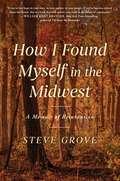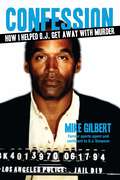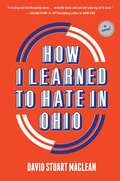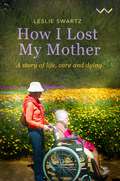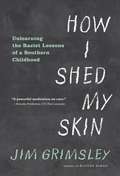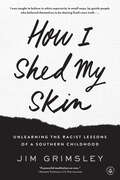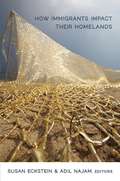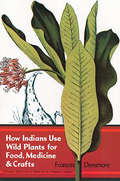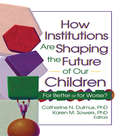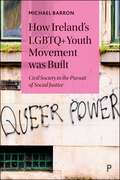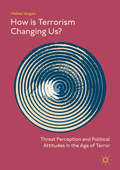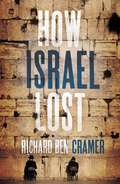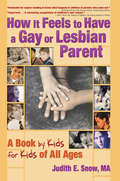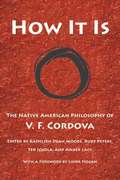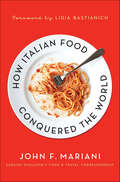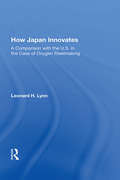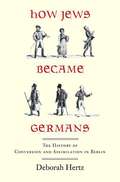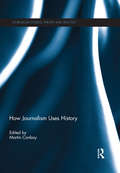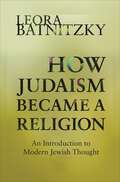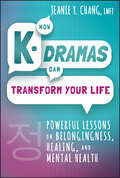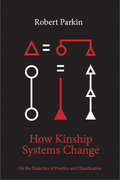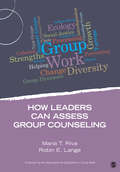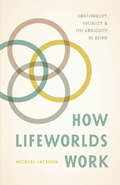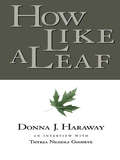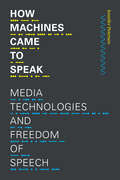- Table View
- List View
How I Found Myself in the Midwest: A Memoir of Reinvention
by Steve GroveA passionate testimony to the power of moving forward by going back home, a Midwestern native shares hope in going local.Just after turning forty, Steve Grove left Silicon Valley as a Google executive to move to his home state of Minnesota with his wife and fellow tech exec, Mary Grove, and their one-year-old twins. Gone from the Midwest for two decades, Grove returned home with fresh eyes. Yearning to put down new roots, he traded his career at Google for a position in state government with Governor Tim Walz. Far from working at a fast-paced tech company, Grove&’s shift to leading a large government bureaucracy brought a sequence of struggles and triumphs vividly portrayed with both humor and affection. But this story of reinvention takes on new urgency when crisis strikes, as the coronavirus pandemic and the tragic murder of George Floyd unfolds just miles from his newfound home, thrusting Grove&’s work into an unexpected spotlight. Tasked with distributing billions in aid, rolling out pandemic restrictions, redeveloping neighborhoods, and navigating deep divisions in a state long proud of its exceptionalism, Grove&’s journey through crisis brings new insights about himself and his new community. His experiences of the political, geographic, and racial divisions in his home state yield surprising discoveries about what also binds us together. From making new friends and building a family to reconciling with his past and exploring his faith, Grove&’s journey to find purpose by going local provides a roadmap for anyone looking to discover what gives meaning to their life. Along the way, Grove shares insights about a part of the country that many people ignore at their peril, and why he is optimistic about America&’s future. How I Found Myself in the Midwest will move and inspire you, no matter where you choose to call home.
How I Helped O.J. Get Away With Murder: The Shocking Inside Story Of Violence, Loyalty, Regret, And Remorse (American Crime Stories Ser.)
by Mike GilbertYou Don't Know the Full Truth About O.J. Simpson and the Murders that Gripped a Nation.But Mike Gilbert does, and after nearly two decades of being O.J. Simpson's sports agent, business advisor, and trusted confidant, Gilbert is breaking his silence and telling the full story of the man he idolized, but now despises.Gilbert's shocking tale is unlike anything you've read before; it isn't his "version" of what happened--it's the unvarnished truth. The truth about O.J., the murders, and the infamous trial. Not as Gilbert imagined or would like it to be, but how it actually was. Gilbert doesn't spare anyone, not even himself--he helped deceive the jury and feels deeply responsible for the "Not Guilty" verdict.So why is Gilbert speaking out now? Has he gone from sinner to saint? Is he making a play for sympathy or looking to make a quick buck? No. (Proceeds from this book are going to the March of Dimes and other selected charities with which Gilbert has long been associated.) Gilbert is writing this book because he regrets what he did for his adored, childhood idol. He can no longer find any excuse for how he has shielded O.J. Simpson; and he is determined that the full truth must now be told, including:* O.J.'s late night confession to Gilbert* How Gilbert was responsible for O.J.'s hand not fitting the murder glove* Why O.J. murdered Nicole Simpson and Ron Goldman (it was more than jealousy)* Why Gilbert defended O.J. for so long--and what finally convinced him he could do so no longer* How O.J. ignored his financial obligations to the Goldman family and milked the tabloids for money* The real reason why an armed O.J. burst in on the memorabilia collectors in Las Vegas (Gilbert had what O.J. was looking for)Told with searing candor, this book leaves no one's reputation intact--not even Gilbert's. But he casts a glaring light on how celebrity can corrupt, how power can mislead, and how friendship and loyalty can be perverted. His book is meant to set the record straight, to lay to rest the ghosts of that dreadful night that have haunted him ever since, and to now play what little part he can to forward the process the of justice.
How I Learned to Hate in Ohio: A Novel
by David Stuart MacLeanIn the rural Ohio of the late 1980s, social outcast Barry Nadler begins his freshman year of high school with low expectations. He resolves to go unnoticed as much as possible, until his world is upended by the arrival in his small town of Gurbaksh Singh, Gary for short, a Sikh teenager. Charismatic and wildly conspicuous, Gurbaksh befriends Barry and, Gatsby-like, pulls him into a series of startling and uncharacteristic exploits. But as Barry becomes if not popular then popular-adjacent at school, the rest of his world starts to unravel. His mom's trips for her job with Marriott seem to keep her away longer. His philosophy professor dad is dealing with something. And soon his classmates and neighbors begin to react to the presence of the Singhs, a family so different from theirs. Through bitingly comic and intelligent asides and observations, the beguilingly self-aware Barry registers the seeds of xenophobia and racism finding fertile soil in this insular community, until, in an easy, graceless, unintentional slide, tragedy unfolds. In bracing prose that captures the authentic voice of a heartrending and hard-earned awakening, David Stuart MacLean's How I Learned to Hate in Ohio shines an uncomfortable light on the roots of white middle-American discontent. At once darkly funny and surprisingly moving, this is a humane, provocative, and undeniably resonant debut novel for our divided world. DAVID STUART MACLEAN is a winner of the PEN Emerging Writers Award for Nonfiction and author of the award-winning memoir The Answer to the Riddle Is Me. His work has appeared in the New York Times, Ploughshares, and Guernica and on This American Life. He has taught creative writing at the University of Chicago, Columbia College, and the School of the Art Institute of Chicago; is co-founder of the Poison Pen Reading Series in Houston; and was a Fulbright scholar to India. Raised in central Ohio, he now lives in Chicago. How I Learned to Hate in Ohio is his debut novel.
How I Lost My Mother: A story of life, care and dying
by Leslie SwartzHow I Lost My Mother is a deeply felt account of the relationship between a mother and son, and an exploration of what care for the dying means in contemporary societyThe book is emotionally complex – funny, sad and angry – but above all, heartfelt and honest. It speaks boldly of challenges faced by all of us, challenges which are often not spoken about and hidden, but which deserve urgent attention. This is first and foremost a work of the heart, a reflection on what relationships mean and should mean. There is much in the book about relationships of care and exploitation in southern Africa, and about white Jewish identity in an African context. But despite the specific and absorbing references to places and contexts, the book offers a broader, more universal view. All parents of adult children, and all adults who have parents alive, or have lost their parents, will find much in this book to make them laugh, cry, think and feel.
How I Shed My Skin: Unlearning the Lessons of a Racist Childhood
by Jim GrimsleyMore than sixty years ago, the Supreme Court ruled in Brown v. Board of Education that America''s schools could no longer be segregated by race. Critically acclaimed novelist Jim Grimsley was eleven years old in 1966 when federally mandated integration of schools went into effect in the state and the school in his small eastern North Carolina town was first integrated. Until then, blacks and whites didn''t sit next to one another in a public space or eat in the same restaurants, and they certainly didn''t go to school together. Going to one of the private schools that almost immediately sprang up was not an option for Jim: his family was too poor to pay tuition, and while they shared the community''s dismay over the mixing of the races, they had no choice but to be on the front lines of his school''s desegregation. What he did not realize until he began to meet these new students was just how deeply ingrained his own prejudices were and how those prejudices had developed in him despite the fact that prior to starting sixth grade, he had actually never known any black people. Now, more than forty years later, Grimsley looks back at that school and those times--remembering his own first real encounters with black children and their culture. The result is a narrative both true and deeply moving. Jim takes readers into those classrooms and onto the playing fields as, ever so tentatively, alliances were forged and friendships established. And looking back from today''s perspective, he examines how far we have really come. "Does more to explain the South than anything I''ve read in a long, long time... Simply put, a brilliant book. While I was reading, I kept thinking two things. One, this is totally shocking. Two, it''s not at all shocking but a familiar part of my life and memory. Grimsley''s narrative is straightforward and plain spoken while at the same time achingly moving and intimately honest. " --Josephine Humphreys, author of No Where Else on Earth "I not only believed this account but was grateful to see it on the record... The boy in this narrative is becoming a man in a time of enormous change, and his point of view is like a razor cutting through a callus. Painful and healing. Forthright and enormously engaging. This is a book to collect and share and treasure. " --Dorothy Allison, author of Bastard Out of Carolina "Jim Grimsley''s unflinching self-examination of his own boyhood racial prejudices during the era of school desegregation is one of the most compelling memoirs of recent years. Vivid, precise, and utterly honest, "How I Shed My Skin" is a time machine of sorts, a reminder that our past is every bit as complex as our present, and that broad cultural changes are often intimate, personal, and idiosyncratic." --Dinty W. Moore, author of Between Panic and Desire "In all his beautiful works, Jim Grimsley has told hard, hidden truths in luminous, subtle prose... Here, he renders history not on the grand, sociological scale where it is usually written, but on very personal terms, where it is lived. This is an exquisite, careful story of a white boy of simple background and great innocence. " --Moira Crone, author of The Not Yet "Grimsley probes the past to discover what and how he learned about race, equality, and democracy... in this revelatory memoir. " --Kirkus Reviews "Acclaimed writer Grimsley offers a beautifully written coming-of-age recollection from the era of racial desegregation. " --Booklist, starred review
How I Shed My Skin: Unlearning the Racist Lessons of a Southern Childhood
by Jim GrimsleyMore than sixty years ago, the Supreme Court ruled in Brown v. Board of Education that America’s schools could no longer be segregated by race. Critically acclaimed novelist Jim Grimsley was eleven years old in 1966 when federally mandated integration of schools went into effect in the state and the school in his small eastern North Carolina town was first integrated. Until then, blacks and whites didn’t sit next to one another in a public space or eat in the same restaurants, and they certainly didn’t go to school together. Going to one of the private schools that almost immediately sprang up was not an option for Jim: his family was too poor to pay tuition, and while they shared the community’s dismay over the mixing of the races, they had no choice but to be on the front lines of his school’s desegregation. What he did not realize until he began to meet these new students was just how deeply ingrained his own prejudices were and how those prejudices had developed in him despite the fact that prior to starting sixth grade, he had actually never known any black people. Now, more than forty years later, Grimsley looks back at that school and those times--remembering his own first real encounters with black children and their culture. The result is a narrative both true and deeply moving. Jim takes readers into those classrooms and onto the playing fields as, ever so tentatively, alliances were forged and friendships established. And looking back from today’s perspective, he examines how far we have really come.
How Immigrants Impact their Homelands
by Eckstein Susan Eva Najam AdilHow Immigrants Impact Their Homelands examines the range of economic, social, and cultural impacts immigrants have had, both knowingly and unknowingly, in their home countries. The book opens with overviews of the ways migrants become agents of homeland development. The essays that follow focus on the varied impacts immigrants have had in China, India, Cuba, Mexico, the Philippines, Mozambique, and Turkey. One contributor examines the role Indians who worked in Silicon Valley played in shaping the structure, successes, and continued evolution of India's IT industry. Another traces how Salvadoran immigrants extend U. S. gangs and their brutal violence to El Salvador and neighboring countries. The tragic situation in Mozambique of economically desperate émigrés who travel to South Africa to work, contract HIV while there, and infect their wives upon their return is the subject of another essay. Taken together, the essays show the multiple ways countries are affected by immigration. Understanding these effects will provide a foundation for future policy reforms in ways that will strengthen the positive and minimize the negative effects of the current mobile world. Contributors. Victor Agadjanian, Boaventura Cau, José Miguel Cruz, Susan Eva Eckstein, Kyle Eischen, David Scott FitzGerald, Natasha Iskander, Riva Kastoryano, Cecilia Menjívar, Adil Najam, Rhacel Salazar Parreñas, Alejandro Portes, Min Ye
How Indians Use Wild Plants for Food, Medicine & Crafts
by Frances Densmore"Learn the natural ways of the Chippewa Indians with this great book from Dover." — Texas Kitchen and Garden and MoreThe uses of plants — for food, for medicine, for arts, crafts, and dyeing — among the Chippewa Indians of Minnesota and Wisconsin show the great extent to which they understood and utilized natural resources. In this book those traditions are captured, providing a wealth of new material for those interested in natural food, natural cures, and native crafts.In separate sections describing the major areas of use, Miss Densmore, an ethnologist with the Smithsonian Institution, details the uses of nearly 200 plants with emphasis on wild plants and lesser-known uses. For those interested in natural foods she gives extensive coverage to the gathering and preparation of maple sugar and wild rice, as well as preparations for beverages from leaves and twigs of common plants, seasonings including mint and bearberry, the methods of preparing wild rice and corn, cultivated and wild vegetables, and wild fruits and berries. On Indian medicines she tells the basic methods of gathering plants and the basic surgical and medical methods. Then she gives a complete list of the plants with their botanical names, uses, parts used, preparation and administration, and other notes and references. Also covered are plants used as charms, plants used in natural dyes, and plants in the useful and decorative arts including uses for household items, toys, mats, twine, baskets, bows, and tools, with special emphasis on the uses of birch bark and cedar. This section will be especially useful for supplying new and unusual craft ideas. In addition, 36 plates show the many stages of plant gathering and preparation and many of the artistic uses. While a number of the plants discussed are native only to the Great Lakes region, many are found throughout a wide range.Those studying the Indians of the Great Lakes region, or those trying to get back to nature through understanding and using natural materials, will find much about the use of plants in all areas of community life. Because of Miss Densmore’s deep knowledge and clear presentation, her study remains a rich and useful source for learning about or using native foods, native cures, and native crafts.
How Institutions are Shaping the Future of Our Children: For Better or for Worse?
by Catherine Dulmus Karen SowersImprove services for children and youth with new concepts, different perspectives, and up-to-date information! How Institutions are Shaping the Future of Our Children: For Better or for Worse? explores the positive and negative impacts of social institutions on child and adolescent well-being. Experts in the fields of social work and child welfare provide a broad perspective on how to improve outcomes for children and adolescents who receive institutional services either directly or indirectly. This book contains innovative strategies for reducing the negative outlook for children and families in shelters, foster homes, and residential treatment centers. This book offers improvements for care services at such locations as: residential institutions state custody and foster homes schools youth development organizations urban public housing developments homeless shelters In How Institutions are Shaping the Future of Our Children, you&’ll discover current case studies that show how certain groups-such as minorities and economically challenged children and families-are stigmatized by the current child welfare system. You&’ll also find new evidence of the detrimental effects that can occur as a result of institutionalization and the need to find alternatives to removing children and adolescents from family-style environments. This book contains tables to clarify the findings of these case studies, references to further your reading, and detailed descriptions of plans and programs that you can implement in your own social work practice. How Institutions are Shaping the Future of Our Children presents new ways to create positive environments for children and adolescents, including: strengths-based approaches to practice with children with severe emotional and behavioral disturbances custody planning for the children of HIV-infected women discipline-specific education for child protection caseworkers creating supportive staff-youth relationships within all institutions multiple family group interventions which help to strengthen homeless families in preparation to transition to permanent housing the School Development Program, Child Development Project, and Comprehensive Quality Programming-interventions for preventing school drop-outs Life Plans for post-institutionalized youth
How Ireland’s LGBTQ+ Youth Movement was Built: Civil Society in the Pursuit of Social Justice
by Michael BarronThis book offers a unique insider perspective from a queer author and activist who was centrally involved in Ireland’s journey from 1993, the year when homosexuality was decriminalised, to 2015, when it became the first country in which marriage equality was enacted by popular vote. It is the first comprehensive study of the impact of LGBTQ+ youth civil society as a leading force on Irish public policy change. Interdisciplinary in nature, it uses both activist and academic frames to reassess LGBTQ+ activism histories. It draws on personal, historical and policy analysis to provide a comprehensive account of how civil society can drive progressive change in difficult conditions. Essential reading for understanding the significant public policy changes that have occurred in Ireland, this book provides deep insight into the dynamics of organised social change over long periods of time and offers lessons for future work in this area.
How Is Terrorism Changing Us?: Threat Perception And Political Attitudes In The Age Of Terror
by Matteo VerganiThis book examines how the perception of terrorism threat erodes civil liberties, sows doubt about the loyalties of immigrants, and heightens the left-right ideological divide. The book presents original analysis of survey data and experiments conducted in Australia, Europe and the United States.Research in the book posits questions that others have largely avoided: How does the threat of terrorist violence undermine multicultural democracies? What are the psychological and social mechanisms that explain how the threat of terrorism can change political attitudes? What is the relationship between terrorism and death threats? What is the role of media in shaping the perception of terrorism threat? And what are the ethical responsibilities of journalists? This book will help readers distinguish between groundless speculation and solid scientific knowledge of the topic. Moreover, it provides concrete recommendations on how to prevent the most negative consequences of the polarization of political attitudes, such as social divisions, exclusivism and conflict. Given the broad geographical scope of the research presented in the book, specifically North America, Europe and Australia, this book will appeal to broad scope of readers.
How Israel Lost: The Four Questions
by Richard Ben CramerOnce in a great while, a book comes along that not only discusses a topic of interest, it changes the boundaries of that discussion forever. This is such a book. InHow Israel LostRichard Ben Cramer analyzes the four questions that have bedeviled Israel and Palestine for almost forty years:I. Why Do We Care About Israel?II. Why Don't the Palestinians Have a State?III. What Is a Jewish State?IV. Why Is There No Peace?With personal observation and sharp and challenging argument, Cramer insists that Israel is losing her soul by maintaining her occupation of the lands conquered in the Six Day War. Israel has become a victim of that occupation no less than the Palestinians, who must have a nation of their own. Cramer makes clear for the first time why the occupation endures and how it corrupts and corrodes the societies of both Arab and Jew. Cramer's portrait of those societies is both up to the minute and timeless, enlivened at every step by his trademark humor, by humane understanding of the people caught in the conflict, and by his astonishing gift for language, theirs and ours. Both his observations and arguments are drawn with startling clarity, informed by the fierce and fearless reporting that won him the Pulitzer Prize for Middle East coverage twenty-five years ago. The result is a book destined to produce both heat and light -- it is both shocking and a delight to read. This is journalism so sharp that it will change the story it set out to tell.
How It Feels to Have a Gay or Lesbian Parent: A Book by Kids for Kids of All Ages
by Judith E. SnowSometimes I fantasize about having a magic wand. How awesome it would be to wave it and completely eliminate prejudice, hate, and ignorance. Just imagine what it would be like to live in a world like that. How It Feels to Have a Gay or Lesbian Parent: A Book by Kids for Kids of All Ages gives voice to the thoughts, feelings, and experiences of children, adolescents, and young adults who have a gay or lesbian parent. In their own words, they talk openly and candidly about how and when they learned of their parent&’s sexual orientation and the effect it had on them-and their families. Their stories echo themes of prejudice and harassment, conflict and confusion, adaptation and adjustment, and hope for tolerance and a family that can exist in harmony. "Because it&’s an issue for other people, it becomes an issue for me. I&’m angry about the way it works against me." The stories told in How It Feels to Have a Gay or Lesbian Parent not only reflect the day-to-day struggle of children with a GLBT parent, they also reveal the pain inherent in high-conflict divorce and child custody cases. Children of gay/lesbian parents ranging in age from seven to 31 recall the confusion and grief created when the disclosure of their parent&’s true sexual orientation ended a marriage and divided a family. The "straight" parent&’s resentment can lead to angry remarks that-intentionally or unintentionally-disparage the gay/lesbian parent and threaten the natural love and affection the child feels for both. "I guess the hardest part about having a gay dad is that no matter how okay you are with it, there&’s always going to be someone who will dislike you because of it." The one-on-one interviews presented in How It Feels to Have a Gay or Lesbian Parent document first-hand the effects of homophobia on family life. Children struggle with the choice between living in a closet, shamed by peers and family members, or dealing with discrimination as a parent&’s sexual orientation is used against them. Taken together, these stories make a statement for acceptance, understanding, and tolerance as children do their best to make the transition from a traditional family to a nontraditional lifestyle. "My mom is a normal person just like everyone else. The only thing that&’s different about her is that she&’s gay and if you can&’t deal with it, you&’re just going to have to live with it." How It Feels to Have a Gay or Lesbian Parent: A Book by Kids for Kids of All Ages offers comfort and support to children from those who share their journey. The book is a valuable aid for practitioners working with children of GLBT parents and an educational tool for GLBT adults considering children.
How It Is: The Native American Philosophy of V. F. Cordova
by Linda Hogan Kurt Peters Ted Jojola V F Cordova Kathleen Moore Amber LacyViola Cordova was the first Native American woman to receive a PhD in philosophy. Even as she became an expert on canonical works of traditional Western philosophy, she devoted herself to defining a Native American philosophy. Although she passed away before she could complete her life's work, some of her colleagues have organized her pioneering contributions into this provocative book.
How Italian Food Conquered the World
by John F. MarianiNot so long ago, Italian food was regarded as a poor man's gruel-little more than pizza, macaroni with sauce, and red wines in a box. Here, John Mariani shows how the Italian immigrants to America created, through perseverance and sheer necessity, an Italian-American food culture, and how it became a global obsession. The book begins with the Greek, Roman, and Middle Eastern culinary traditions before the boot-shaped peninsula was even called "Italy," then takes readers on a journey through Europe and across the ocean to America alongside the poor but hopeful Italian immigrants who slowly but surely won over the hearts and minds of Americans by way of their stomachs. Featuring evil villains such as the Atkins diet and French chefs, this is a rollicking tale of how Italian cuisine rose to its place as the most beloved fare in the world, through the lives of the people who led the charge. With savory anecdotes from these top chefs and restaurateurs: - Mario Batali- Danny Meyer- Tony Mantuano- Michael Chiarello- Giada de Laurentiis- Giuseppe Cipriani- Nigella LawsonAnd the trials and triumphs of these restaurants:- Da Silvano- Spiaggia- Bottega- Union Square Cafe- Maialino- Rao's- Babbo- Il Cantinori
How Japan Innovates: A Comparison With The U.s. In The Case Of Oxygen Steelmaking
by Leonard L LynnThe speed with which the Japanese have adopted new industrial technology has been a major factor in their economic success, raising the question of how they have been able to carry out technological change so quickly and so smoothly, often outstripping their U.S. competitors. How Japan Innovates examines this question in depth by comparing t
How Jews Became Germans: The History of Conversion and Assimilation in Berlin
by Deborah Hertz<P>When the Nazis came to power and created a racial state in the 1930s, an urgent priority was to identify Jews who had converted to Christianity over the preceding centuries. With the help of church officials, a vast system of conversion and intermarriage records was created in Berlin, the country’s premier Jewish city. Deborah Hertz’s discovery of these records, the Judenkartei, was the first step on a long research journey that has led to this compelling book. Hertz begins the book in 1645, when the records begin, and traces generations of German Jewish families for the next two centuries. <P>The book analyzes the statistics and explores letters, diaries, and other materials to understand in a far more nuanced way than ever before why Jews did or did not convert to Protestantism. Focusing on the stories of individual Jews in Berlin, particularly the charismatic salon woman Rahel Levin Varnhagen and her husband, Karl, a writer and diplomat, Hertz humanizes the stories, sets them in the context of Berlin’s evolving society, and connects them to the broad sweep of European history.
How Journalism Uses History (Journalism Studies)
by Martin ConboyHow Journalism Uses History examines the various ways in which journalism uses history and historical sources in order to better understand the relationships between journalists, historians and journalism scholars. It highlights the ambiguous overlap between the role of the historian and that of the journalist, and underlines that there no longer seems to be reason to accept that one begins only where the other ends. With Journalism Studies as a developing subject area throughout the world, journalism history is becoming a particularly vivacious field. As such, How Journalism Uses History argues that, if historical study of this kind is to achieve its full potential, there needs to be a fuller and more consistent engagement with other academics studying the past: political, social and cultural historians in particular, but also scholars working in politics, sociology, literature and linguistics. Contributors in this book discuss the core themes which inform history’s relationship with journalism from a wide range of geographical and methodological perspectives. They aim to create more ambitious conversations about using journalism both as a source for understanding the past, and for clarifying ideas about its role as constituent of the public sphere in using discourse and tradition to connect contemporary audiences with history. This book was originally published as a special issue of Journalism Practice.
How Judaism Became a Religion: An Introduction to Modern Jewish Thought
by Leora BatnitzkyA new approach to understanding Jewish thought since the eighteenth centuryIs Judaism a religion, a culture, a nationality—or a mixture of all of these? In How Judaism Became a Religion, Leora Batnitzky boldly argues that this question more than any other has driven modern Jewish thought since the eighteenth century. This wide-ranging and lucid introduction tells the story of how Judaism came to be defined as a religion in the modern period—and why Jewish thinkers have fought as well as championed this idea.Ever since the Enlightenment, Jewish thinkers have debated whether and how Judaism—largely a religion of practice and public adherence to law—can fit into a modern, Protestant conception of religion as an individual and private matter of belief or faith. Batnitzky makes the novel argument that it is this clash between the modern category of religion and Judaism that is responsible for much of the creative tension in modern Jewish thought. Tracing how the idea of Jewish religion has been defended and resisted from the eighteenth century to today, the book discusses many of the major Jewish thinkers of the past three centuries, including Moses Mendelssohn, Abraham Geiger, Hermann Cohen, Martin Buber, Zvi Yehuda Kook, Theodor Herzl, and Mordecai Kaplan. At the same time, it tells the story of modern orthodoxy, the German-Jewish renaissance, Jewish religion after the Holocaust, the emergence of the Jewish individual, the birth of Jewish nationalism, and Jewish religion in America.More than an introduction, How Judaism Became a Religion presents a compelling new perspective on the history of modern Jewish thought.
How K-Dramas Can Transform Your Life: Powerful Lessons on Belongingness, Healing, and Mental Health
by Jeanie Y. ChangDiscover the power of how K-Dramas can improve your wellbeing and provide a sense of belonging Love K-Dramas and want more permission to binge watch them? In How K-Dramas Can Transform Your Life: Powerful Lessons on Belongingness, Healing, and Mental Health, Licensed Marriage and Family Therapist Jeanie Y. Chang explores what K-Dramas can teach us about our own well-being and how we can use the lessons they teach us to live better and more meaningful lives. She also touches upon the powerful interrelationship between K-dramas, mental health, and belongingness. Topics covered include: Using K-Dramas as a roadmap to life, showing you how to navigate speed bumps, roadblocks, twists, turns, and dead ends Building cross-cultural relationships that you otherwise may not have without being a K-Drama fan Processing grief from the loss of a loved one to a loss of anything—a job, your physical safety, a relationship, or something else Harnessing the idea of Jeong, which is innate in Korean society and refers to the emotional sentiment of affinity, affection, kinship, and connection which is the thread throughout Jeanie's community Working the author’s trademarked mental health framework, Cultural Confidence®, to build up your mental health, identity, mindfulness, and resilience For K-Drama fans and enthusiasts and anyone curious about the influence of pop culture, How K-Dramas Can Transform Your Life is an entertaining and educational must-read on how this enormously popular global phenomenon can help us become the best versions of ourselves.
How Kinship Systems Change: On the Dialectics of Practice and Classification
by Robert ParkinUsing some of his landmark publications on kinship, along with a new introduction, chapter and conclusion, Robert Parkin discusses here the changes in kinship terminologies and marriage practices, as well as the dialectics between them. The chapters also focus on a suggested trajectory, linking South Asia and Europe and the specific question of the status of Crow-Omaha systems. The collection culminates in the argument that, whereas marriage systems and practices seem infinitely varied when examined from a very close perspective, the terminologies that accompany them are much more restricted.
How Leaders Can Assess Group Counseling (Group Work Practice Kit)
by Robin E. Lange Maria T. RivaA practical guide to evaluating group process and outcomes Ample evidence demonstrates that well-planned and delivered group work can benefit members. Equally important is the continual improvement of group work practice, achieved through the evaluation of each individual group experience. How to Evaluate Groups provides practical guidance on how you can establish—or collaborate with researchers to accomplish—research designs aimed at evaluating group process and outcomes. This accessible book: Covers group work measures, including both quantitative and qualitative approaches Includes tips on implementing research designs Draws from an up-to-date scholarly base that includes the latest research on group work How to Evaluate Groups is part of the Group Work Practice Kit: Improving the Everyday Practice of Group Work, a collection of nine books each authored by scholars in the specific field of group work. To promote a consistent reading experience, the books in the collection conform to editor Robert K. Conyne’s outline. Designed to provide practitioners, instructors, students, and trainees with concrete direction for improving group work, the series provides thorough coverage of the entire span of group work practice. This book is endorsed by the Association for Specialists in Group Work.
How Lifeworlds Work: Emotionality, Sociality, and the Ambiguity of Being
by Michael JacksonMichael Jackson has spent much of his career elaborating his rich conception of lifeworlds, mining his ethnographic and personal experience for insights into how our subjective and social lives are mutually constituted. In How Lifeworlds Work, Jackson draws on years of ethnographic fieldwork in West Africa to highlight the dynamic quality of human relationships and reinvigorate the study of kinship and ritual. How, he asks, do we manage the perpetual process of accommodation between social norms and personal emotions, impulses, and desires? How are these two dimensions of lived reality joined, and how are the dual imperatives of individual expression and collective viability managed? Drawing on the pragmatist tradition, psychology, and phenomenology, Jackson offers an unforgettable, beautifully written account of how we make, unmake, and remake, our lifeworlds.
How Like a Leaf: An Interview with Donna Haraway
by Donna Haraway Thyrza GoodeveThe author of four seminal works on science and culture, Donna Haraway here speaks for the first time in a direct and non-academic voice. How Like a Leaf will be a welcome inside view of the author's thought.
How Machines Came to Speak: Media Technologies and Freedom of Speech (Sign, Storage, Transmission)
by Jennifer PetersenIn How Machines Came to Speak Jennifer Petersen constructs a genealogy of how legal conceptions of “speech” have transformed over the last century in response to new media technologies. Drawing on media and legal history, Petersen shows that the legal category of speech has varied considerably, evolving from a narrow category of oratory and print publication to a broad, abstract conception encompassing expressive nonverbal actions, algorithms, and data. She examines a series of pivotal US court cases in which new media technologies—such as phonographs, radio, film, and computer code—were integral to this shift. In judicial decisions ranging from the determination that silent films were not a form of speech to the expansion of speech rights to include algorithmic outputs, courts understood speech as mediated through technology. Speech thus became disarticulated from individual speakers. By outlining how legal definitions of speech are indelibly dependent on technology, Petersen demonstrates that future innovations such as artificial intelligence will continue to restructure speech law in ways that threaten to protect corporate and institutional forms of speech over the rights and interests of citizens.
